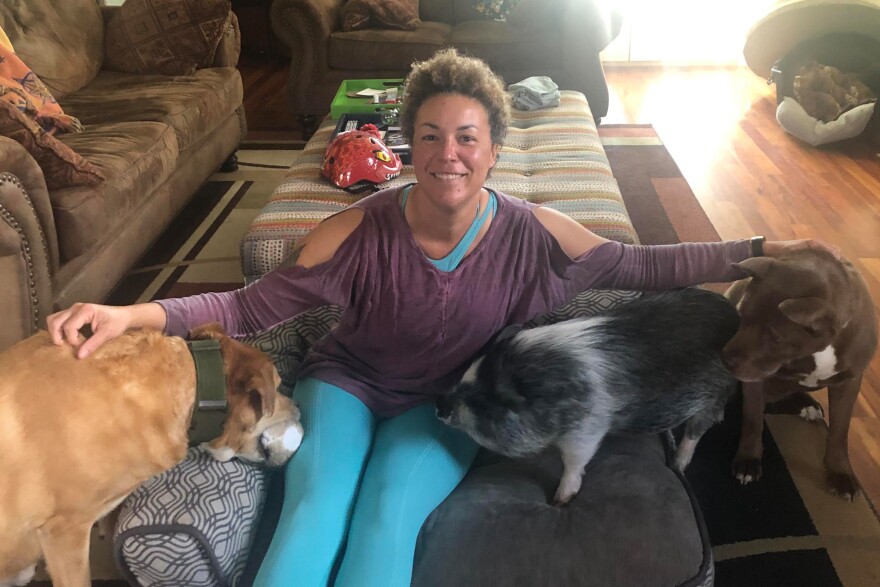As Nevadans caucus later this month, health care issues are at the forefront for many. Some of those voters want mental health to be a vital part of that national debate. The state is ranked 51st in the nation for mental health care according to a report from Mental Health America.
Reno resident Felicia Perez takes nearly a dozen pills each day. That’s down from the 15 she used to take, when she was first diagnosed with a rare disease in 2012.
“I had my first MRI, and it was discovered that I had a tumor wrapped around my optic nerve. I had 11 rounds of radiation, and it grew and became a brain tumor as well,” Perez explained. “I’ve had three of these tumors. I’ve had 20 MRIs, I’ve had 40 chemo infusions, and there’s no end in sight. I have a very rare autoimmune disorder that will eventually cause lymphoma or a rare eye cancer. And this is how I will pass from this life.”
Perez was a former high school history teacher in Los Angeles and is currently working part-time remotely for an organization that supports social justice. She said her illness has affected her mental health.

“I also have severe anxiety, some depression, from grieving the life that I used to have,” Perez said, “and always contending with the way that my life changes year to year, and what those limitations are.”
Getting access to mental health care has been challenging for Perez. She had to fight with her private insurance carrier to keep the therapist she’d been working with, and on top of that, she has gone into debt. There’s a nearly $8,000 annual deductible to pay for, and her health makes it difficult to maintain a full-time job.
For now, Perez is walking an emotional tightrope.
“Somewhere between sad and angry. And every once in awhile, I look up and I see some hope, but it quickly fades. It’s like a bubble,” Perez explained. “I’d rather be angry than sad, because anger at least allows me to still have the desire to fight and sad just [makes] me not have the energy anymore to fight, and between the illness and politics, that’s where we’re at these days.”
Perez said for candidates to get her vote, this is what she wants to hear: “I’m going to need to hear, mental health not be separated from health care, period. Mental health is a health care issue,” Perez said. “The fact that we don’t give it the kind of attention that it needs right now in this country is because we’re not giving our health care system the kind of attention that it needs.”
Robin Reedy heads the state’s National Alliance on Mental Illness, or NAMI Nevada.
“You know, it's really tough for candidates to talk specifically toward any one item when they're trying to get elected,” Reedy said.

That’s why the national arm of NAMI joined a coalition pushing for policies that support access to care.
NAMI reports that Republican political platforms are traditionally more likely to increase health care options while reducing mandates. In comparison, Democrats are more likely to enforce the federal mandate Mental Health Parity and Addiction Equity Act of 2008 to ensure the equal coverage of mental health conditions and substance abuse disorders.
“I want people to recognize that a disorder of the brain is the same as a disorder of the heart,” Reedy explained, “or the pancreas, or whatever other organ in your body, and treat it equally.”
But for Nevadans, access to mental health care is a problem. According to Mental Health America, about two out of three adults statewide with a mental illness received no treatment. And the state has a shortage of providers.
“We don't have enough regular doctors,” Reedy said, “let alone a psychiatrist, psychologist or psychiatric nurses.”
Reedy says that there aren’t enough mental health treatment centers in Nevada, and many with severe mental health illness end up in the emergency room. Dr. Cari Croghan is based in Reno and has been an emergency room physician for more than two decades. She says insufficient access to mental health care has been draining the overall medical system.
"The other day, we had 40 patients in our waiting room, waiting for up to six to eight hours,” Croghan explained. “We had 16 psychiatric patients. Well, if we could get the psychiatric patients to a place where they were actually healing and doing better, we could have emptied out that waiting room in two hours.”

For Croghan, mental health should be a policy priority for candidates and not a politicized issue.
“This isn’t necessarily a red or blue thing. This isn’t, ‘Oh, you’re a communist. Oh, you’re a redneck.’ This is humanity,” Croghan said. “Psychiatric illness does not know race, creed, religion, nothing. It’s just like any other illness.”
The Mental Health for America report also found that Nevada has the highest prevalence of mental illness and lowest access to care among young people.






